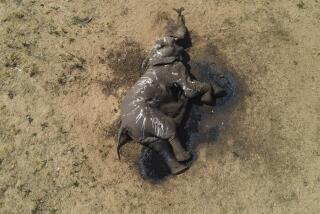Elite Zimbabwe Squad Wages War to Save Endangered Black Rhino
- Share via
CHIKWENYA CAMP, Zimbabwe — One of Africa’s last refuges for the endangered black rhinoceros is a battle zone.
Heavily armed poachers who cross the broad Zambezi River to shoot one of nature’s ugliest animals for its highly prized horns are themselves hunted by an elite squad of Zimbabwe’s paramilitary game wardens under orders to shoot on sight.
Along a 150-mile river frontage, Chief Warden Glen Tatham, 17 national parks officers and 80 scouts patrol a hot, dry bush where visibility sometimes drops to less than 10 yards because of the dense overgrowth.
Statistics suggest how effective they have been in their 2-year-old Operation Stronghold: 29 poachers killed, 22 captured, an undetermined number wounded.
The only loss on Tatham’s side was a scout killed by a lioness while he slept in the field.
At the center of the battle zone is Chikwenya, a luxury safari camp on the Zambezi River.
Guests are given armed escorts to the camp’s sturdy thatched huts around which lions, elephants and buffaloes roam by night.
But Tatham and his men are here to protect 500 black rhinos, Africa’s largest concentration of the endangered beast. Conservationists say that only 800 black rhinos remain in Africa. After Zimbabwe, neighboring South Africa has the next largest group.
Tatham, who is called Gen. Patton by his men because of his stiff military manner, said the poaching problem reached Zimbabwe in mid-1984 after poachers wiped out the last of 3,000 rhinos in neighboring Zambia and crossed the Zambezi River into Zimbabwe in search of more.
Tatham claimed that Zimbabwe is getting little help from Zambia in its fight against the poachers. He complained that Zambian authorities have not adequately armed their game wardens and do not share information.
The United States has been the principal foreign supporter of Operation Stronghold, giving $532,000 since 1985.
U.S. Ambassador James Rawlings spent four days here recently, and Tatham told him he needed 300 more men and a second helicopter to secure the river from poachers and to move rangers swiftly around the valley.
“The poachers cross day and night,” Tatham said. “They are experts at concealing their tracks. Once they have tracked a rhino, its poor eyesight makes for an easy downwind kill, avoiding its keen smell and hearing.”
Rawlings took a helicopter tour of part of the 7,500 square miles of hinterland that Tatham’s men patrol and met some of them on the front line.
It looks like a guerrilla war setting.
“These Zambians invade our country with automatic weapons,” said Wilfred Mavesere, one of the game wardens who spends most of his days lying in ambush for poachers. “They get about $4,600 a horn, many times their minimum wage, so they don’t surrender.
“We don’t show ourselves. We shoot them where they stand. If the unarmed porters run, we shoot them too.”
The shoot-to-kill policy has raised tensions with Zambia, a close ally. Some Zambian legislators demand closure of the border.
“I wish they would,” Mavesere said, “at least for the poachers.”
Rhinos are killed for their horns, the spiked tuft of hair that is unique to the rhino. A rhino horn is sold for up to $24,000 in the Far East, where they are used to make traditional medicines, and in the Middle East, where they are fashioned into ornamental handles for daggers.
It’s estimated that poachers have killed more than 60,000 of Africa’s black rhinos.
Zimbabwe has one of Africa’s best conservation records. Besides sending armed men into the bush to wage war on rhino poachers, it has moved more than 200 rhinos from the Zambezi Valley to other national parks and private game farms.
Tatham said he is angered by the idea of rhinos having to be moved from their habitat and his men having to risk their lives to protect the rhinos that remain.
“It can only mean corruption in several countries on a big scale,” he said. “Zambian President (Kenneth) Kaunda is known to be strongly against the poaching. But lower officials let him down.
“If the African countries concerned cooperated with us, we could stop this slaughter.”
More to Read
Sign up for Essential California
The most important California stories and recommendations in your inbox every morning.
You may occasionally receive promotional content from the Los Angeles Times.













